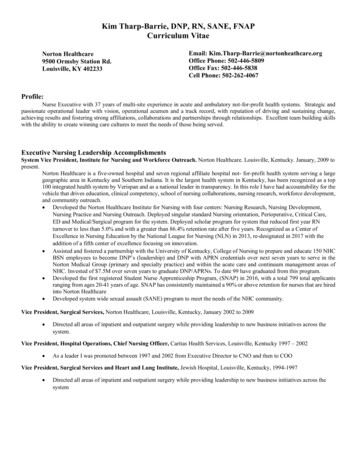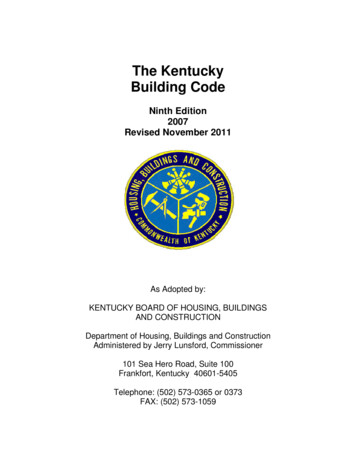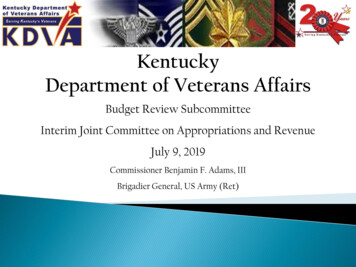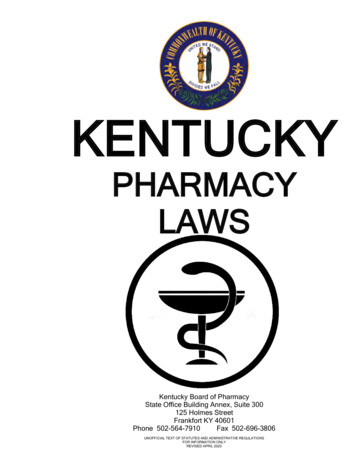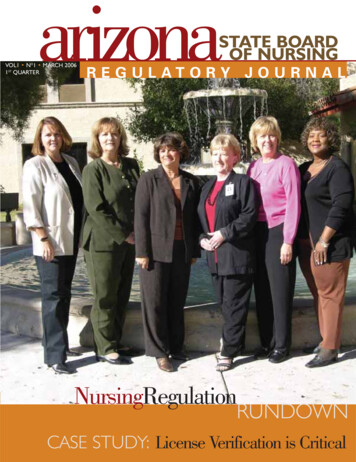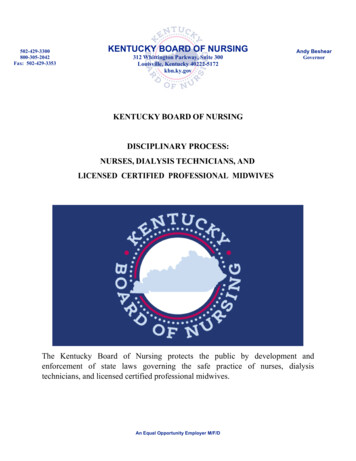
Transcription
502-429-3300800-305-2042Fax: 502-429-3353KENTUCKY BOARD OF NURSING312 Whittington Parkway, Suite 300Louisville, Kentucky 40222-5172kbn.ky.govAndy BeshearGovernorKENTUCKY BOARD OF NURSINGDISCIPLINARY PROCESS:NURSES, DIALYSIS TECHNICIANS, ANDLICENSED CERTIFIED PROFESSIONAL MIDWIVESThe Kentucky Board of Nursing protects the public by development andenforcement of state laws governing the safe practice of nurses, dialysistechnicians, and licensed certified professional midwives.An Equal Opportunity Employer M/F/D
Produced by KBN Investigation Branch StaffRevised by Jeffrey R. Prather, Legal Services Section SupervisorIntroductionThe General Assembly has authorized the Kentucky Board of Nursing to regulate thenursing profession to protect and safeguard the health and safety of the citizens of theCommonwealth of Kentucky. See, Kentucky Revised Statutes (KRS) 314.021(1).All individuals licensed or privileged under provisions of this chapter shall beresponsible and accountable for making decisions that are based upon theindividuals' educational preparation and experience in nursing and shall practicenursing with reasonable skill and safety.Id. at (2).Similar language is codified in regulation for dialysis technicians (DTs) and licensedcertified professional midwives (LCPMs). This article will focus on the disciplinary process forthe three license types that are within the jurisdiction of the Kentucky Board of Nursing.Kentucky is a Mandatory reporting state in which any person, including the licensee, thathas knowledge that a violation of laws, pertaining to nurses or DTs is required to report it to theBoard pursuant to KRS 314.031(4) (nurses) and KRS 314.035(3) (dialysis technicians). A LCPMor an employer of an LCPM, must report any violation of KBN regulations by an LCPM to theBoard pursuant to KRS 314.408(4). Any violations detailed in KRS 314.091(1), 201 KAR 20:470,and 201 KAR 20:630 are subject to these reporting requirements.I have received a complaint, what happens then?If the complaint establishes a colorable violation, the Board staff notifies the licensee viamail. The licensee is sent a Notice of Complaint letter, a copy of the complaint, and an OfficialResponse Form to the address of record with the Board. The licensee must provide a written,legible, verified response to the Board within 30 days of receipt of the complaint. Id. at §1(4). TheBoard expects the licensee to cooperate fully with these requests. See, KRS 314.095.Please be sure your address of record is correct! The licensee “is deemed to have consentedto service of notices or orders of the board at the mailing address on file with the board” andcorrespondence “mailed or delivered to the mailing address on file with the board constitutes validservice of the notice or order.” See, KRS 314.107; 201 KAR 20:370 §1(10), 201 KAR 20:470§13(1), 201 KAR 20:630 §4(1).If the Board has “reasonable cause” to believe that the licensee is unable to practice withreasonable skill and safety, or that the individual has abused alcohol, drugs, or controlledsubstances, the Board has the authority to order the licensee to undergo a mental health,neuropsychological, psychosocial, psychosexual, substance use disorder, or physical evaluation.An Equal Opportunity Employer M/F/D
See KRS 314.085. It is worth noting that every licensee is deemed to a have consented to thisauthority. Moreover, the licensee is responsible for paying the cost of the evaluation and selectingthe appropriate evaluator from a list approved by the Board.Moreover, Board staff may also request an informal meeting with the licensee to discussthe allegations. See, 201 KAR 20:161 §1(4)(c). Investigative meetings are routine, and the licenseemay have private counsel attend, as well.Potential Actions by the BoardNot all complaints are equal.Working While Under InvestigationGenerally, if the license is current, the licensee is allowed to maintain employment inKentucky during the investigation. The details of the investigation are confidential until finalresolution, and that the licensee may practice without restrictions provided the license expirationdate is current and there is no active discipline. The fact that an investigation is ongoing isconveyed if an employer or other interested person contacts the KBN to determine the licenseeor credential holder is under investigation No other information about the investigation isshared at that time. The employer may submit a written request to the KBN to be notified of theoutcome. The exception to this is if an Immediate Temporary Suspension is issued.Immediate Temporary SuspensionsIn rare cases, the allegations rise to a level that may require an immediatetemporary suspension of the license. This an emergency action, taken unilaterally by theBoard, against an individual’s license when there is an urgent need to protect the health andsafety of the public.The President of the Board may determine that an Immediate Temporary Suspension of alicense is to be issued when “disciplinary action or an investigation is pending,” andsuch immediate or emergency action is necessary in order to protect the public. The ExecutiveDirector of the Board, or designee, may issue the Order of Immediate Temporary Suspension(“ITS Order”). See, KRS 314.089. In addition to allegations that involve public protection,immediate temporary suspensions may also be ordered for failure to pay a license fee (see, KRS314.075); for failure to pay court ordered child support (see, KRS 205.712); or for failure tocomply with a request for a Board ordered evaluation as described in the following paragraph.If the Board has entered an ITS Order against a license, the licensee may seekprompt review by requesting an emergency hearing “to determine the propriety of theOrder.” An emergency hearing is scheduled within ten (10) “working days” of the request forhearing, and the Board has the burden of proof to affirm the propriety of the Order bypresenting “substantial evidence.” See, KRS 314.089, KRS 13B.125. The emergency hearing isconducted by a Hearing Officer. If the ITS Order is affirmed, it becomes a “Final Order.” Thelicensee may appeal to the Jefferson Circuit Court. Id. Regardless, the cost of the emergencyhearing may be imposed upon the licensee. See, 201 KAR 20:162 §7An Equal Opportunity Employer M/F/D
How are complaints resolved?Closed: The Board may find that the claim is unsubstantiated: that there is no basis or proof ofthe allegation. When this occurs, the complaint is closed by Board staff.Letter of Concern: The Board may find that there is a basis for the complaint, but it does not riseto the level of a civil penalty, continuing education hours, reprimand, suspension, or revocation.In this case, the Board may issue a Letter of Concern, which expresses concern regarding an issuediscovered during the investigation. Letters of Concern are not considered discipline actionagainst the license.Consent Decree: If the Board finds that the incident was minor or non-intentional, it may enterinto a Consent Decree with the licensee. The licensee waives the right to a formal administrativehearing and agrees to pay a civil penalty. Additional continuing education related to the nature ofthe complaint may be a term. Consent Decrees are considered informal action.Agreed Order: Board staff may offer a negotiated settlement. An “Agreed Order” is asettlement under which the licensee admits the violation, and negotiates with the Board staff thespecific terms of the discipline. Agreed Orders have to be approved by and executed by the KBNExecutive Director. Once they are, they have the full force and effect of a decision renderedthrough the hearing process and are considered a formal disciplinary action. Like a ConsentDecree, the licensee waives the right to a formal hearing, as well as the due process rights affordedunder KRS Chapter 13B.Civil Penalties of up to 10,000 may be imposed by the Board.What are the possible actions that can be taken against a license?Reprimand: Reprimands are discipline, but they may not affect the licensee’s ability to practice.They generally impose a civil penalty and require completion of additional continuing education.If appropriate, it may be necessary for the licensee to submit to drug screening.Limitation/Probation: In other cases, the license to practice is limited or probated. The licenseecontinues to practice, subject to conditions determined by KBN. Restrictions may include: thearea in which the licensee is allowed to practice; practicing with supervision; and/or having limitedor no access to narcotics or other medication. Probation may include: meetings with KBN staff;random drug/alcohol screens; substance abuse treatment; and employer reports.Voluntary Surrender: A licensee can agree to surrender the license for a period, but it may bereinstated after certain conditions are met, unless the licensee has signed a permanent voluntarysurrender.Suspension: The licensee loses the right to practice nursing for a specific amount of time. TheBoard’s order will specify conditions that must be met prior to reinstatement of the license, whichmay include: a substance use disorder, mental health, neuropsychological, and/or physicalAn Equal Opportunity Employer M/F/D
evaluation; counseling reports; random drug/alcohol screens; and letters of recommendation. Ahearing may be required to consider reinstatement of a license.Reinstatement Denied: Reinstatement of a lapsed/suspended license can be denied by KBN untilspecific conditions are met.Licensure Denied The applicant is denied licensure in the commonwealth of Kentucky.Revocation: The licensee loses the ability to practice in the commonwealth of Kentucky. Alicensee may reapply for a license after the period of time specified by the Board’s Order unless apermanent revocation is entered. A nurse will be required to retake and successfully pass theNational Council Licensure Examination (NCLEX).Failure to comply with the terms entered will result in the license being suspended ordenied reinstatement. If the Board and the licensee fail to reach a resolution to the allegations, theHearing process may be initiated.Formal Administrative HearingsInvestigations proceed to the administrative hearing process if the licensee chooses not torespond to the allegations or chooses not to accept the proposed settlement. The hearing processis initiated by the issuance of the Notice of Hearing and Statement of Charges. The Notice ofHearing informs the licensee, or “Respondent,” that the Board of Nursing, the “Petitioner,” isbringing formal action against the licensee. The notice lists the specific charges or violations oflaw, provides the date, time, and location of the hearing, and a statement of the licensee’s legalrights. The Respondent is required to file a response or answer to the charges within twenty daysof receipt of the Notice of Hearing and Statement of Charges; the failure to do so may result in anadmission of those unanswered charges. If the Respondent fails to respond or participate in theHearing Process, the Hearing Officer has the authority to grant a Default Order in favor of theprosecution. It is not a defense to state the licensee did not respond because the licensee did notreceive the Notice – if Board staff sent it to the address of record.The Respondent may elect to proceed to a hearing without counsel; however, theRespondent has a right to hire counsel to represent them.A pre-hearing conference will be scheduled. This is a meeting between the Respondentand her/his attorney, if applicable, the investigator, the prosecuting attorney, and the HearingOfficer to discuss preliminary matters prior to the actual hearing date. If requested, the HearingOfficer can issue subpoenas for witnesses to testify on behalf of the Respondent. The prosecutingattorney is the counsel for the Board responsible for bringing the Statement of Charges andpresenting the case before the Hearing Panel, as well as any post-hearing process. The Respondent,and counsel for the Respondent have a right to be present at all times except during deliberationsof the Hearing Panel.The Kentucky Rules of Evidence may not apply in the Board’s disciplinary hearings. Forexample, hearsay evidence is admissible at the discretion of the Hearing Officer. The Board’sExecutive Director and the Hearing Officer have authority to issue subpoenas.A panel consisting of two Board Members and the Hearing Officer conduct the hearing,which is open to the public. The Board Members on the hearing panel act as the “finders of thefact” (i.e., jurors), and base their decision in the case solely upon the evidence properly admittedAn Equal Opportunity Employer M/F/D
at the hearing. At the conclusion of the hearing, the panel goes into closed session to deliberate thecase. The Hearing Officer’s primary role is to conduct the hearing and rule on legal issues raisedby the parties, much like a judge. Moreover, at the hearing’s conclusion, the Hearing Officer votesas a tiebreaker if the Board members are split regarding a ruling. In the case of an emergencyhearing, only the Hearing Officer presides. See, KRS 13B.If found guilty of at least one of the charges, the Respondent shall bear the costs of theHearing Officer fee, court stenographer fee, civil penalty, and the cost of the Board hired expertwitness, if applicable.COVID-19During the Pandemic, the Hearing Officer has ordered that the panel, parties, and witnessesattend the hearing via video conference, unless either party objects.Due Process of LawThe Respondent’s rights are guaranteed by the strict adherence to the constitutionalprinciples of Due Process. The Respondent has the right to representation by an attorney of his orher own choice and retention; the right to confront and cross-examine witnesses; the right topresent witnesses and evidence; and the right to present rebuttal testimony.The Board has the “Burden of Persuasion.” The Board must prove its case by a“preponderance of evidence” or in the case of an emergency hearing, by “substantial evidence.”Both parties may make an opening statement, present evidence, and make a closingargument before the Panel deliberates.Deliberation and Recommended OrderAt the conclusion of the evidence, the Hearing Panel deliberates in a closed session. TheHearing Panel issues a “recommended order,” which is not final until it has been reviewed and“ratified” (i.e., approved) by the full Board at the next regular Board meeting. The Hearing Officerprepares the recommended Findings of Fact, Conclusions of Law, and Order, and the parties have15 days after the Hearing Officer has mailed the Recommended Order to file “exceptions” to theRecommended Order.Final OrderThe Recommended Order and any exceptions are submitted to the full Board for review,and ratification. The Board has 90 days after the receipt of the Recommended Order to issue itsFinal Order. The Final Order must be based solely on the testimony and exhibits introduced asevidence at hearing.Right to AppealShould the ruling be adverse to the Respondent, she or he has the right to appeal to theJefferson County Circuit Court. The party filing the appeal, now the “Appellant,” must file theappeal within 30 days after the Final Order is mailed to the parties. Appeals are solely based onAn Equal Opportunity Employer M/F/D
the record of the Hearing and on relevant legal objections raised during the hearing. Appeals arenot new hearings – no new evidence is presented. Should the appeal before the Jefferson CircuitCourt be unsuccessful, the appellant may seek further appeals before the Kentucky Court ofAppeals, and the Kentucky Supreme Court (at its discretion).Final DispositionsAll final KBN disciplinary actions are subject to the Kentucky Open Records Act. Inaddition, disciplinary actions are published in the KBN Connection and, when required by law, arereported to the National Council of State Boards of Nursing Data Bank; National PractitionersData Bank; Health and Human Services, Office of Inspector General; and other state or federalagencies.The information provided is intended as an overview of the KBN disciplinary process. The licensee should refer tothe applicable statutes and regulations.09/2010; 06/2017; 07/2019; 04/2021; 04/2022An Equal Opportunity Employer M/F/D
KENTUCKY BOARD OF NURSING 312 Whittington Parkway, Suite 300 Louisville, Kentucky 40222-5172 kbn.ky.gov Andy Beshear Governor 502 -429 -3300 800 -305 2042 Fax: 502-429 -3353 An Equal Opportunity Employer M/F/D . KENTUCKY BOARD OF NURSING . DISCIPLINARY PROCESS: NURSES, DIALYSIS TECHNICIANS, AND . LICENSED CERTIFIED PROFESSIONAL MIDWIVES



